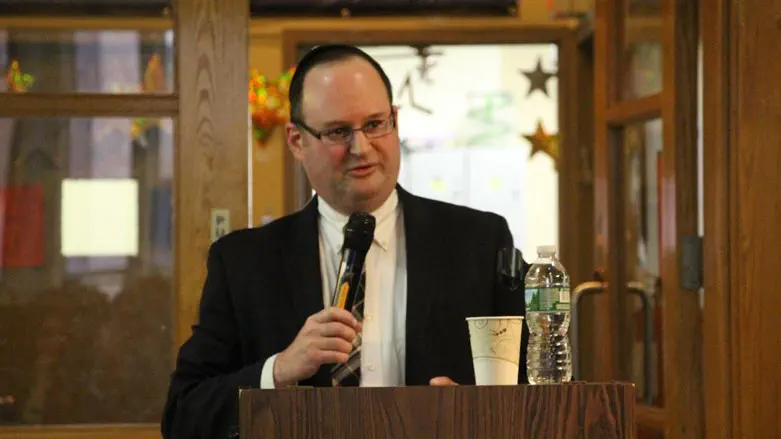
This week's haftarah, which is the first of the Shev D'Nechemta, the Seven Haftarot of Consolation read between Tisha B'Av and Rosh Hashanah, is quite complex.
God announces that the future Geulah, the Redemption, will arrive suddenly, powerfully and majestically, but the Navi (Prophet – i.e. Yeshayahu/Isaiah) replies that the Jewish People, compared to dry, shriveled and spiritless grass as a result of a seemingly endless period of persecution and estrangement during the Exile, will be almost unable to absorb the message. (This is in line with how the Abarbanel understands the complicated metaphoric text and is its simplest understanding.)
It is akin to Moshe’s initial replies to God that the Children of Israel would not accept the tidings of forthcoming freedom from slavery and departing Egypt, after years of bondage and persecution which dulled the people’s senses and made them nearly impervious to messages of positive change. God proceeds to declare in Yeshayahu’s prophecy that He can accomplish anything (including the miraculous Geulah), and that no creature preceded Him or can be compared with Him; God has exclusive command and control of the universe, and the entirety of creation has an extremely limited comprehension of God’s scheme and Providence.
In fact, the words of the haftarah closely echo God’s reply to Iyov (Job) that no one is in a position to question the Divine workings, for creation hasn't an inkling of the larger picture, to which only God is privy, and man is a mere limited object in the face of the unfathomable omnipotence and inscrutable omniscience of God.
The haftarah concludes with an assurance that God will again embrace and closely tend to His people, as the entire panoramic saga of the Geulah sweepingly unfolds and God brings us near to Him. Everyone will be personally included in the redemptive process.
This is anything but a simple haftarah of consolation; it is a major hashkafic (philosophic) treatise and more.
What is the unique message of the haftarah and of the commencement of this period of nechama (consolation)? And is there any connection between the haftarah and the parshah?
I believe that the nevu'ah, the prophecy, in the haftarah provides the keys for how exactly to be consoled and anticipate the Geulah.
More challenging and painful than being afflicted is the sense that there is no hope, when the situation appears very bleak and the future is unknown, with no light at the end of the tunnel. The horrors of the Galut (Exile), as a result of God's Hester Panim, Hiding of His Face, seem to be too much to bear, as the Jewish People has acutely experienced an estrangement from God in particular periods of the prolonged Galut. Being in this situation with a feeling that it will never end and that things will likely get worse and remain such for eternity is excruciating and can totally break one down.
This is precisely where the point of our haftarah comes in. Yeshayahu conveys the pivotal message from God that in reality, He is there with us at every moment and has not abandoned His nation, and that the bitter Galut is part of a much larger scheme that is under His constant control and supervision. People may believe that all is hope is lost and permanently gone, as they are unable to perceive the entire situation and are quite limited in their scope and vision. God assures and comforts us that He is always there and will in time return His Presence to our midst with the breathtaking Geulah, and that we cannot give up, for we are not in a position to understand, and we must accept this fact. Once we internalize this message, we are consoled and comforted, with a fresh and secure new outlook on life and the future of K'lal Yisroel.
This would appear to be tied to the broader theme of Parshat Va’etchanan, in which the foundations of emunah (faith) are presented, as the parshah features God’s manipulation of nature and supernatural communion with us at Har Sinai with the proclamation of the Aseret Ha-Dibrot (Ten Commandments), followed by the Shema, which establishes the central pillars of our belief. These concepts are presented in the context of exhortations by Moshe to heed the Word of God, along with narratives of God’s unparalleled care of us.
The haftarah, based on these themes, affirms that God’s commitment to us remains unchanged, and that through faith in His eternal mastery and oversight of all that transpires and of His Presence always being there, despite the darkness of Hester Panim and the often crushing challenges of Galut, will we persevere and be able to harbor a positive anticipation for the Geulah, whereupon everything good will be dramatically restored and we will be consoled and comforted by God’s powerful and loving embrace.
Nechama is predicated upon keeping perspective of the long-term, larger picture, which we cannot perceive with our limited senses and emotions. Only by internalizing the Torah’s teachings of God’s mastery over all and a realization that there is much more occurring beyond what meets the eyes can we endure and behold the Geulah.
Rabbi Avrohom Gordimer is Chairman of the Rabbinic Circle of the Coalition for Jewish Values, serves on the editorial board of Jewish Action magazine and a staff writer for the Cross-Currents website. He is a member of the RCA and NY Bar, and an account executive at a large Jewish organization based in Manhattan